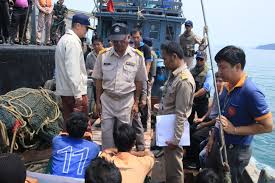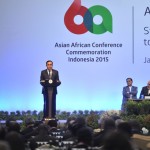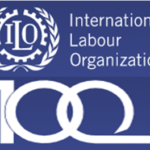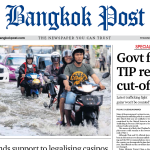
The CEO of Thai Union Group, the country’s largest seafood company, insisted last week that the government has made substantial progress against illegal fishing and human trafficking in the fishing and seafood industries and that recently released reports of abuses are based on information that is out of date.
The comments by Thiraphong Chansiri of Thai Union came after the release of a report released by Nestlé, the Switzerland-based global food corporation, which alleged widespread human trafficking and other abuses among Thai suppliers of fish for its cat food products. Nestlé commission Verité, a non-governmental organization, to investigate and write the report.
Verité conducted its investigation in late 2014 and early 2015. In May, the Thai police, already conducting their own investigations into human trafficking syndicates, began arresting hundreds of suspects including military and police officers, politicians, bureaucrats and civilian gang members in the biggest case against human trafficking in the country’s history.
Around the same time, the Thai government began devising and implementing wide-ranging measures to end illegal, unregulated and unreported (IUU) fishing and crack down on trafficking and labor abuse in the industry. The moves to clean up the fishing industry followed a warning by the European Union that failure to stop IUU fishing could result in a ban on Thai seafood imports.
Thiraphong urged the public to consider whether reports by Nestlé and others contained up-to-date and accurate information. “Many times they were reports about things in the past. What people should give importance to is the progress, efforts, and determination to tackle this issue,” he said. Thai Union announced earlier this year it was ending business with suppliers suspected of trafficking.
His comments echoed those of Thailand’s ambassador to the United States Pisan Manawapat who said that Nestlé’s report was conducted largely before the Thai governments took several major steps against trafficking and IUU fishing. He cited the huge increase in prosecutions of traffickers, the requirement for vessel tracking systems on larger trawlers, mandated independent observers on Thai fishing ships plying foreign waters, and much more severe penalties for those who violate laws and regulations.
Thailand’s Fisheries Department has implemented the Vessel Monitoring System (VMS) since 2011 and by July 24, 2015, all fishing trawlers of over 30 tons are imposed to install VMS which is one of the six action plans from the Government’s Roadmap to eliminate IUU fishing. It helps enhancing efficiency in control and regulate fishing ground by linking system among VMS centers with 60 surveillance fishery patrol vessels for involving operation and data among patrol vessels, VMS centers and fishing ports.
Government spokesman Sansern Kaewkamnerd said the administration of Prime Minister Prayut Chan-o-cha has been demonstrating its strong commitment to act against traffickers and IUU fishing, whereas previous governments had largely ignored the issues.
“But the problems have built up for a long time, and so eliminating them will take time. Other countries have similar problems. So cooperation is key,’’ Sansern said. Poj Aramwattananont, president of the Thai Frozen Foods Association, said that everyone was concerned about the accuracy and potential impact of the Nestlé report.
“Both the government and business operators have been working together to address the labor problems and make them priority issues,” he said, insisting that real progress has been made in recent months, after the period covered in the report.
For more information and updates about Thailand’s policies and actions against trafficking in persons and related issues, visit www.thaianti-humantraffickingaction.org




